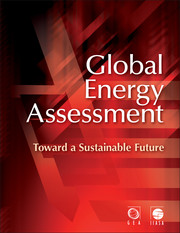Book contents
- Frontmatter
- Contents
- Section 1
- Section 2
- Section 3
- Cluster 1
- Cluster 2
- Cluster 3
- Chapter 17 Energy Pathways for Sustainable Development
- Chapter 18 Urban Energy Systems
- Chapter 19 Energy Access for Development
- Chapter 20 Land and Water: Linkages to Bioenergy
- Chapter 21 Lifestyles, Well-Being and Energy
- Cluster 4
- Section 4
- Index
- References
Chapter 20 - Land and Water: Linkages to Bioenergy
Published online by Cambridge University Press: 05 September 2012
- Frontmatter
- Contents
- Section 1
- Section 2
- Section 3
- Cluster 1
- Cluster 2
- Cluster 3
- Chapter 17 Energy Pathways for Sustainable Development
- Chapter 18 Urban Energy Systems
- Chapter 19 Energy Access for Development
- Chapter 20 Land and Water: Linkages to Bioenergy
- Chapter 21 Lifestyles, Well-Being and Energy
- Cluster 4
- Section 4
- Index
- References
Summary
Executive Summary
Sustainably managing limited resources, such as productive land areas and available freshwater, will be one of the world's most pressing challenges in the coming years. Population increases and economic growth will significantly influence humanity's future demand for land and water for different uses. In particular, changes in food and energy use will have substantial environmental impacts. They will also influence each other in many ways. At the same time, the production of food and energy, and the water resources they require, will be affected by global climate change. Sustainability issues arising from competition and synergies between future production of bioenergy and food, and related water use, are highly important in this context.
Population growth is one of the factors contributing to increased demand for land and water. While the world's population has approximately doubled since the 1960s, global economic activity has increased approximately 40 fold. Since growth in incomes is strongly correlated with increased consumption of animal-derived food (meat, milk, eggs), the combination of population increases and economic growth will likely result in increased feed and food production. This will drive up pressures on land and water resources if not counteracted by innovations that reduce land and water use. Social inequities are increasing as well, with both very rich and very poor populations often practicing ‘inefficient’ methods of using land and water.
- Type
- Chapter
- Information
- Global Energy AssessmentToward a Sustainable Future, pp. 1459 - 1526Publisher: Cambridge University PressPrint publication year: 2012
References
- 14
- Cited by



